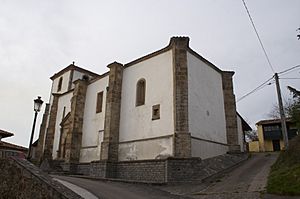Iglesia de San Emeterio (Sietes) facts for kids
Quick facts for kids Iglesia de San Emeterio (Sietes) |
|
|---|---|

The Church of Saint Emeterius in Sietes, Asturias.
|
|
| 43°25′56″N 5°22′03″W / 43.43213°N 5.36759°W | |
| Location | Asturias, |
The Church of Saint Emeterius (in Spanish, Iglesia de San Emeterio) is a historic Roman Catholic church located in the small village of Sietes. This village is part of the beautiful region of Asturias in northern Spain. The church has been a part of the community for hundreds of years, with its construction dating back to the middle of the 16th century.
Contents
History and Dedication
The church was built around the 1550s. It is named after Saint Emeterius (San Emeterio in Spanish), who was a Roman soldier martyred for his Christian faith in the 3rd century. Along with his brother, Saint Celedonius, he is a patron saint of several towns in Spain. Building a church in his honor shows how important his story was to the people of this region.
For centuries, this church has served as the main religious center for the people living in and around Sietes. It has witnessed many local events, celebrations, and generations of families.
Location in Asturias
The Church of Saint Emeterius is set in a scenic, rural area. Sietes is a parish within the municipality of Villaviciosa, a part of the autonomous community of Asturias. Asturias is famous for its green landscapes, mountains, and historic buildings. The church is a great example of the traditional architecture found in this part of Spain. Its simple and sturdy design fits perfectly with the surrounding natural beauty.
Architectural Features
The church is a simple but charming stone building. Key features include:
- A rectangular shape, which is common for rural churches of that time.
- A bell gable, which is a wall at the front of the church with openings for bells, instead of a full bell tower.
- A covered porch, known as a pórtico, at the entrance. This provided shelter for people gathering before or after services.
The style of the church is typical of the 16th century in rural Spain. It was built to be functional and long-lasting, using local materials like stone and wood.
Cultural Importance
The Church of Saint Emeterius is recognized as a Bien de Interés Cultural, which means it is a landmark of cultural heritage in Spain. This designation helps protect the building for future generations to appreciate. It stands as a symbol of the history, faith, and culture of the Asturian people.
See also
 In Spanish: Iglesia de San Emeterio (Sietes) para niños
In Spanish: Iglesia de San Emeterio (Sietes) para niños
- Asturian art
- Catholic Church in Spain
References
 | Misty Copeland |
 | Raven Wilkinson |
 | Debra Austin |
 | Aesha Ash |

